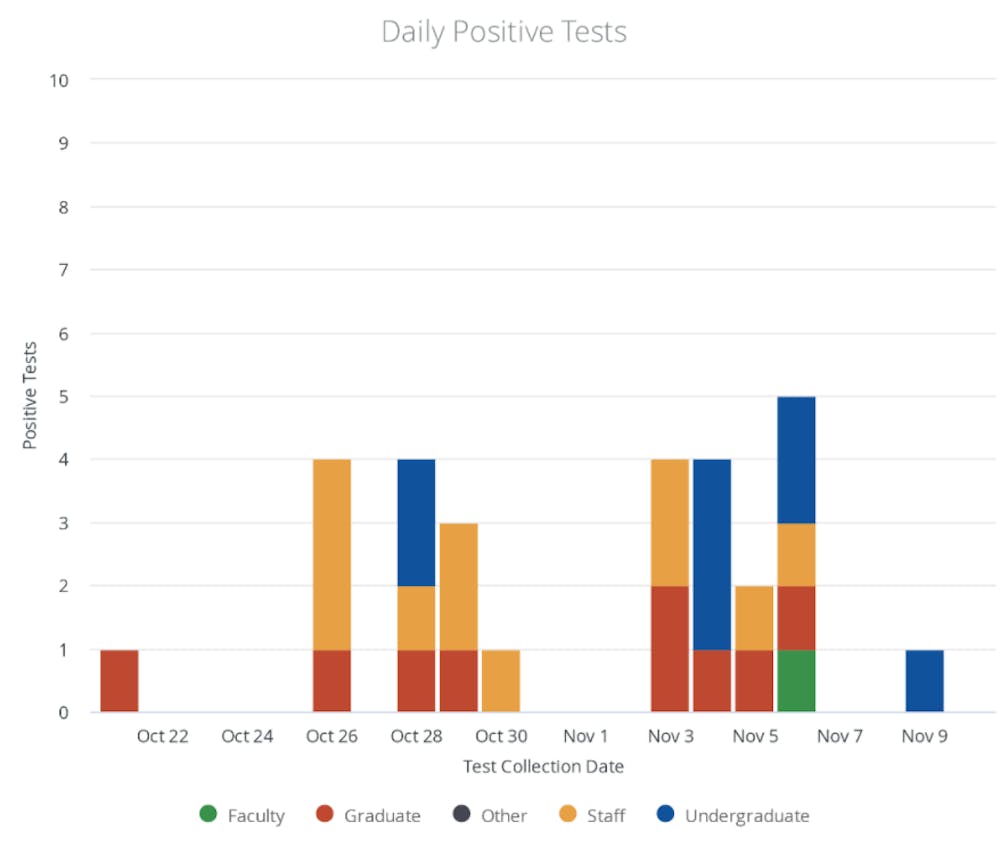Crisis Management reports highest weekly COVID-19 positivity rate all semester

Rice’s Crisis Management Team reported 15 positive tests and a positivity rate of 0.31 percent from Nov. 3 through Nov. 9, the highest weekly positivity rate this semester.
Of the 15 positive tests this week, five were from undergraduate students, five were from graduate students, four were from staff members and one was from a faculty member. In addition to the 15 positive tests administered by Rice, there was one self-reported positive test from an outside test provider.
The second-highest number of weekly positive tests was seen during the previous week. Between Oct. 27 and Nov. 2, Crisis Management reported 12 positive tests plus one self-reported positive test from an outside test provider that week, for a positivity rate of 0.3 percent.
Kevin Kirby, chair of the Crisis Management Advisory Committee, said that based on contact tracing efforts, the Crisis Management Team believes that most of these cases came from off campus.
“They weren’t from any one school, they weren’t from any one residential college, they weren’t from any one building. They weren’t all undergrads, they weren’t all grads. It’s just all over the place. And you can count on one hand the number of cases we believe were from an on-campus transmission, since Aug. 1,” Kirby said.
Kirby said in the COVID-19 Response Weekly Update for Nov. 9 that the Rice positivity rate increased to 0.3 percent for each of the past
two weeks.
“These numbers are a reminder that we must stay vigilant both on and off campus and engage in personal health practices that protect ourselves and others,” Kirby wrote.
On Oct. 30, there were 19 positive tests, 17 of which were found to be false positives, from one of Rice’s test providers. Jerusha Kasch, director of Institutional Crisis Management at Rice, said at the Student Association Senate meeting on Nov. 2 that it was an extremely high number of positive tests.
“We have never received 20 positive results in one day, much less than one week, so we were very concerned when we had those,” Kasch said.
There was another spike in positive cases in late September and early October. There were seven positive tests from Sept. 22 through Sept. 28, and 10 positive tests from Sept. 29 through Oct. 5.
Dean of Undergraduates Bridget Gorman canceled all in-person events at McMurtry College starting Oct. 2 after three off-campus students and one on-campus student from McMurtry College tested positive for COVID-19. In addition to canceling in-person events, Gorman had McMurtry students test twice a week for the weeks of Sept. 28 and Oct. 5. McMurtry has since returned to allowing in-person events.
“We’re pretty certain [the source of the spread] is off campus,” Kasch said of the increase in positive cases at McMurtry.
From Oct. 6 through Oct. 26, there were nine positive tests total on Rice’s campus, for a positivity rate of 0.06 percent over those three weeks. However, positive tests in the greater Houston area have been increasing since Sept. 21. The Texas Medical Center reports a steady increase in weekly averages of daily new COVID-19 positive cases. In addition, the percentage of positive tests across TMC hospital systems has increased from 3.4 percent in the week of Sept. 21 to 4.3 percent in the week of Nov. 2. The Texas Medical Center currently reports a positivity rate of 4.5 percent in the greater Houston area, compared to the positivity rate of 0.3 percent at Rice for the past two weeks.
According to Kirby, the difference between testing at Rice and testing in the greater Houston area is that, in general, the majority of positive tests at Rice are from asymptomatic cases.
“For the people who are testing in the greater Houston area, it’s not easy to access testing. Most people are motivated to get a test when they’re symptomatic,” Kirby said. “They’re not testing asymptomatic people, generally, as much as we are, so we’re catching people who either would never know they had COVID or catching it before they become symptomatic.”
Kirby said that in the coming months, as people spend more time indoors and they spend more time together over the holidays, it will continue to be important to maintain health practices.
“Don’t let your guard down. Because it’s pervasive, you should assume that you’ll encounter it with family members, at the grocery store, with other people, and you need to keep your distance, you need to wear a mask all the time,” Kirby said. “Wearing a mask all the time is the single most important thing you can do. People are getting fatigue, COVID fatigue, from all of these different changes in how they live, and we really can’t let our guard down, especially over the coming months.”
More from The Rice Thresher

Andrew Thomas Huang puts visuals and identity to song
Houston is welcoming the Grammy-nominated figure behind the music videos of Björk and FKA twigs on June 27.

Live it up this summer with these Houston shows
Staying in Houston this summer and wondering how to make the most of your time? Fortunately, you're in luck, there's no shortage of amazing shows and performances happening around the city. From live music to ballet and everything in between, here are some events coming up this month and next!

Rice to support Harvard in lawsuit against research funding freeze
Rice, alongside 17 other research universities, filed an amicus curiae brief in support of Harvard University’s lawsuit against the Trump administration over more than $2 billion in frozen research grants.

Please note All comments are eligible for publication by The Rice Thresher.